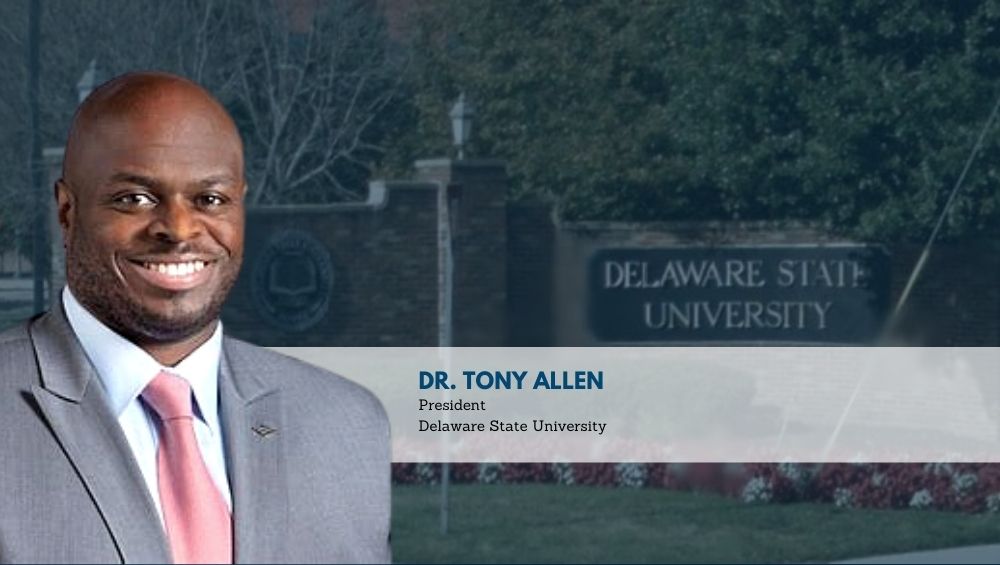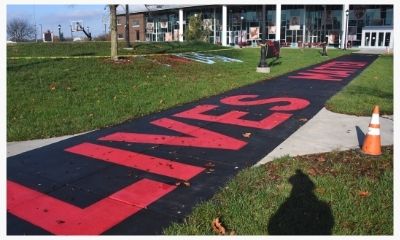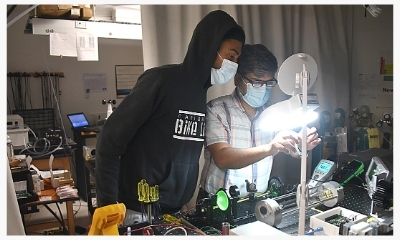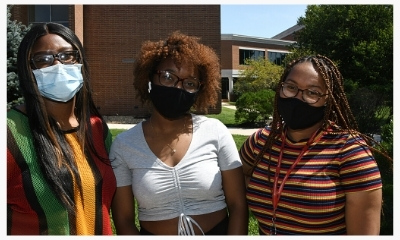Delaware State University President Tony Allen’s Belief in Achieving “the Impossible” Inspires His Institution to Even Greater Success

December 18, 2020 –
Tony Allen became president of Delaware State University on Jan. 1, 2020, after three years as the university’s provost. Before that, he spent nearly 14 years as Bank of America’s head of corporate reputation; president of the Metropolitan Wilmington Urban League; special assistant and speechwriter for then-U.S. Sen. Joe Biden for three years; and Delaware regional director of Public Allies for two years. More recently, Allen was named CEO of the Presidential Inaugural Committee for Biden’s inauguration.
Other recent news includes DSU’s receipt of a $20 million gift from philanthropist MacKenzie Scott. According to Allen, the funding will go toward the University’s Global Institute for Equity, Inclusion and Civil Rights, its ongoing acquisition of Wesley college and the creation of an integrated College of Health and Behavioral Sciences and student scholarships via investment into the DSU endowment.
“I honestly believe in the impossible,” Allen says, “and what Delaware should be, and my ability to help us all get there.”
Tony Allen Recently Spoke to Delaware Prosperity Partnership
DPP: All your rankings by U.S. News improved for 2020, and DSU now ranks as the #3 public HBCU in America. But the big story is your “Social Mobility Index” score being in the top 1% for all U.S. schools. What does that mean to you?
TA: This is the one indicator that captures who we are and what a world-class HBCU does: we change the trajectory of our students’ lives. Delaware State – and our sister HBCU institutions – believe it’s critical that we make sure that the least financially advantaged students are matriculating and graduating on par with the broader student population. Half of our students are Pell-eligible, which is an income standard. Ninety-nine percent of them need financial aid, and some are homeless before they get to us. Traditionally, the extent to which universities are successful for these students has been something that got obscured in the details of the ratings. So when U.S. News put the social mobility indicator out there a few years ago, we knew that it would be important for us to check ourselves. I’m not surprised by the rating, but I am very pleased, not only by our achievement but about how many HBCUs made that top 100 list.
DPP: Is there a metric like increased number of inquiries or applications that will demonstrate the impact of this indicator?
TA: First-year retention is ultimately indicative of graduation success, and we started between about 58% and 61%, 10 years ago. Today we steadily retain our freshmen in the low to mid-70% range. To move that score, you really have to move that population that tends to struggle. And that means fighting to keep every single student you can, whether the issues are money, family or academics. Growth in this category is simply an indication that we are doing what we set out to do.
DPP: What does success look like for DSU?
TA: My priorities this year, when I took office in January, centered around building the financial health for the institution. And that had a lot to do with making sure we are managing our resources efficiently and also bringing new and more resources into the University — which we’ve done. The pandemic just focused the issue more clearly by reducing the margin for error.
Enhancing the culture of the University is also a big priority. I think of culture primarily as both how we interact with each other and our stakeholders, but it also relates to the notion of being more thoughtful as it relates to customer service. Our employees are now realizing that if an issue comes from another division, they need to jump in and help resolve it. Nobody ever says, “There’s a problem with Admissions or with Student Life.” They say, “There’s a problem with Delaware State University.” And we all have to own that.
That goes hand in hand with making sure that we’re creating a healthy and safe environment for our students, every single day, under every possible condition. COVID emphasized that for me. Every night one of the last questions to go through my mind is, “Have we have done our level best today to safeguard our students? If I can honestly answer, “Yes,” I sleep well. Most nights I do sleep well.
 Finally, I made a priority of raising the university profile. One of the ways we thought that was important was to speak into the moment around issues that matter. We have been at the forefront as it relates to the pandemic and the disparities therein, and the civil unrest in America stemming from the systemic mistreatment of people of color by law enforcement.
Finally, I made a priority of raising the university profile. One of the ways we thought that was important was to speak into the moment around issues that matter. We have been at the forefront as it relates to the pandemic and the disparities therein, and the civil unrest in America stemming from the systemic mistreatment of people of color by law enforcement.
That last one was crystallized for me when one young man — a student of almost limitless potential — said to me in a public forum about George Floyd’s death, “I am scared.” It is our collective responsibility, and Delaware State University’s special charge, to construct a world where talented young people do not have to be afraid of dying because of the color of their skin.
DPP: What’s been the biggest (non-COVID) surprise you’ve faced as president?
TA: It’s probably the great pride that the university community has in Delaware State University. I have said for years that Delaware State University is a hidden gem, and we have to change the “hidden” part of that. But I didn’t expect to feel the intensity so mightily as I have now. And it drives you to deliver. You don’t want to disappoint the students, staff, faculty and the alumni who every day are hoping that Delaware State University gets its just reward for what it’s been doing for 130 years.
DPP: You’ve always been known as a guy who believes that “Culture eats strategy for breakfast.” What are your thoughts on that nine months into your presidency?
TA: So we had a whole plan going into January 1 about the university and how we were going to position ourselves, and what our short-term wins would be, and what the long haul would look like. And that all changed overnight.
 The first order of business was helping those students we know are from very vulnerable populations, whether they be homeless or in settings that we just wouldn’t want them returning to. So we made the decision to keep about 200 students on campus and make sure they had the resources they needed to be successful. That’s why we started our emergency relief fund and raised $1.5 million in eight weeks.
The first order of business was helping those students we know are from very vulnerable populations, whether they be homeless or in settings that we just wouldn’t want them returning to. So we made the decision to keep about 200 students on campus and make sure they had the resources they needed to be successful. That’s why we started our emergency relief fund and raised $1.5 million in eight weeks.
That was a very real moment where the faculty, staff and university stakeholders – particularly the alumni – stepped up. Our faculty transitioned 1,400 courses online in five days.
What I think about that as we move forward is if that’s the heart of who we are, it’s not about changing our culture, it’s about evolving it until we can do that more often for more people.
DPP: Is there a group of stakeholders or a group of constituents in particular that you think you need to focus on to achieve your goals?
TA: Probably the business community. If you want a quality, diverse talent pipeline for your institution or company, Delaware State University should be the first phone call you make. But historically it just has not been. I spend a lot of time discussing the civil unrest happening in the country with business leaders and making that case — that if you really are serious about these kinds of issues, there needs to be a bigger, broader, deeper relationship with Delaware State University.
DPP: What do you think differentiates Delaware from other states in terms of being able to attract companies or help the ones that are already here to grow and to either retain or attract college graduates?
TA: I’m originally from Jacksonville, Florida, but I grew up in New Castle. I just think Delaware is a great place to grow up and raise a family.
The second thing I’d say is the smallness of Delaware actually makes for easier partnerships and sort of a unity of focus when it matters most. Our entire congressional delegation is connected to the success of Delaware State University, and it’s rare that you find it’s just one without the others pushing along. I think that’s really important.
This is a place where you get to see your governor in the grocery store or pick up the phone and have a conversation with some of the highest folks in political office, and I think that matters. I think people and businesses want to come here because they see a really thoughtful talent pool that is loyal to the community they’re in and want to be successful.
DPP: What percentage of DSU students stay in Delaware after graduation?
 TA: About 55% of our students are from Delaware. Those students, in large measure, stay local, and that’s good news for us. The number of out-of-state students who stay comes down to (1) what their experience was on campus and (2) the experience they were able to get off campus in the broader community.
TA: About 55% of our students are from Delaware. Those students, in large measure, stay local, and that’s good news for us. The number of out-of-state students who stay comes down to (1) what their experience was on campus and (2) the experience they were able to get off campus in the broader community.
I go back to somebody like Cerron Cade, who’s from D.C. but got engaged in the political scene while on campus at Delaware State. Over the last 10 or 15 years, he connected with lots of people and spent time with then-Congressman John Carney. He worked on a couple of campaigns and showed what he could do. Now he is Delaware’s Secretary of Labor and has been nominated to serve as director of the state Office of Management and Budget.
I think that if you have experiential opportunities while you’re a student on campus, you’re going to find that you can have broader access of the folks you might not be able to get in other places. That can help build your career.
Newsletter Sign Up
Stay Up To Date With Delaware